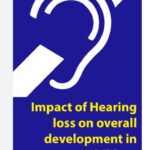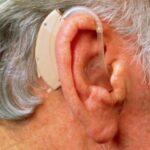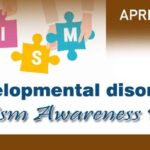

Do we need early intervention for hearing impairment in children? Yes, in fact hearing impairment among children is increasing at a faster pace. So as an early intervention, screening has been made mandatory in developed countries. And it is in the list of health screening procedures for newborns.
Hearing loss or hearing impairment is a partial or total inability for one to hear. A deaf person has little to no hearing. Hearing loss may occur in one or both ears. In children, hearing problems can affect the ability to learn a language and in adults it can cause work related difficulties. The World Health Organization (WHO), states that even as the incidence of hearing impairment among children is increasing at a faster pace, around 60% of it can be prevented by immunization against various diseases, controlling noise pollution and regulating use of certain medicines.
India Specific Statistics:
In India, as per the 2011 census, hearing disability was the second most common cause of disability after locomotor disability.
- Overall, more than 63 million people in India have hearing disability; in other words, three out of every 1000 have moderate, severe or profound bilateral hearing loss. Estimates suggest that 32 per cent have profound hearing loss while 39 per cent have severe hearing loss.
- 4 out of 1000 children are born deaf in India.
- Estimated 400,000 children today under the age of 4 with severe to profound hearing loss.
- Approximately 100,000 children born each year with severe to profound hearing loss.
- Only 2000 of these babies get access to cochlear implant each year.
- Around 466 million people – Over 5% of the world’s population suffers hearing loss, i.e., moderate, severe or profound hearing loss.Causes of childhood hearing loss-40% – genetic causes;31% – infections such as measles, mumps, rubella and meningitis;17% -complications at birth, including prematurity, low birth weight and neonatal jaundice;4% -expectant mothers and newborns unknowingly using medicines that are harmful to hearing.
- WHO estimates that about 60% of hearing loss in children under 15 years of age is preventable and more than 2.5 lakh people in Karnataka suffer from hearing.
Need for early intervention:
Universal Newborn Hearing Screening (UNHS) is a medical procedure for early detection of congenital hearing loss. This test is vital in order to detect hearing impairment in newborn babies and to ensure early intervention. Hearing is often treated as a low profile disability (as it cannot be seen), and this results in low awareness of this disability. Four out of every 1000 infants are born with or develop disabling hearing loss in early childhood. Approximately, 100,000 children born each year with severe to profound hearing loss. Besides, children with mild to severe hearing impairment also suffer from social isolation and stigmatization.
There is a clear consensus that hearing screening and intervention at an early age improves later speech and language development outcomes and these, in turn, should lead to improved socioeconomic prospects in adult life. While UNHS has been made mandatory in developed countries, India still has not included it in the list of mandatory health screening procedures for newborns. Parents identify hearing loss in their children much later during language learning and comprehension; if identified early, as through an UNHS programme, intervention is much more effective. Delays cost children up to 24 months in cognitive development. By contrast, children in countries where UNHS is implemented are able to take corrective measure through early intervention by as low as six months.
Early intervention has significantly lowered the age of diagnosis of hearing loss in children. Studies have also shown that targeted screening of high-risk infants misses half the babies that the UNHS would have identified. Screening had reduced the age at which infants receive hearing aids, from 13-16 months to 5-7 months in developed countries.To be really effective, screening needs to be coupled with an early intervention program, without which there would be no benefit in early diagnosis.
Difference between Hearing aids and Cochlear Implants
Unlike hearing aids, which make sounds louder, cochlear implants bypass the damaged hair cells of the inner ear (cochlea) to provide sound signals to the brain.A cochlear implant is an electronic medical device that replaces the function of the damaged inner ear. Unlike hearing aids, which make sounds louder, cochlear implants bypass the damaged hair cells of the inner ear (cochlea) to provide sound signals to the brain.
The cochlear implant technology can help people who have moderate to profound hearing loss in both ears and receive little or no benefit from hearing aids.Many people have cochlear devices in both ears (bilateral). Listening with two ears can improve ability to identify the direction of sound and separate the sounds one wants to hear from those one doesn’t.
Cochlear Implants – Function & Process
Many people suffer from hearing loss because their hair cells in the inner ear or (or cochlea) are damaged. The cochlear implant enables the sound to be transferred to your hearing nerve and enables you to hear.
The process is described below:
- A sound processor worn behind the ear or on the body, captures sound and turns it into digital code. The sound processor has a battery that powers the entire system.
- The sound processor transmits the digitally-coded sound through the coil on the outside of your head to the implant.
- The cochlear implant converts the digitally-coded sound into electrical impulses and sends them along the electrode array placed in the cochlea (the inner ear).
The implant’s electrodes stimulate the cochlea’s hearing nerve, which then sends the impulses to the brain where they are interpreted as sound.


CITY HEARING AIDS
#3784/1, 13th Cross,
Banashankari 2nd Stage
Bangalore -560070
Phone No.: 9632455673
Phone: 080-26713902
Cell: +91-9739747933











